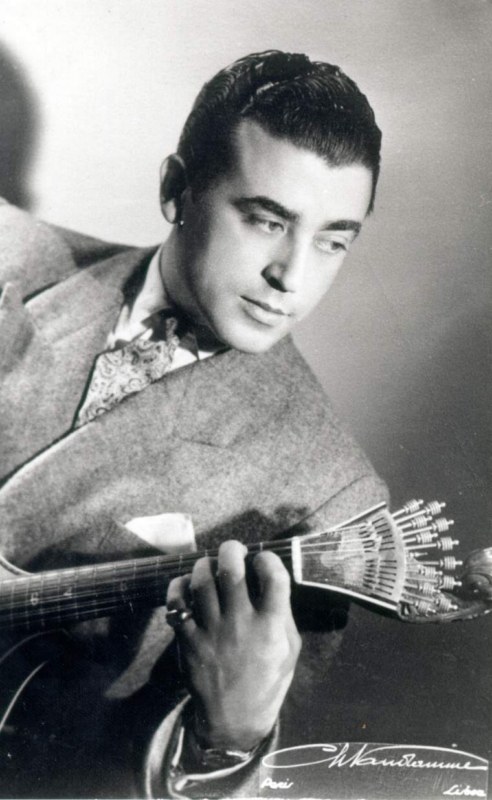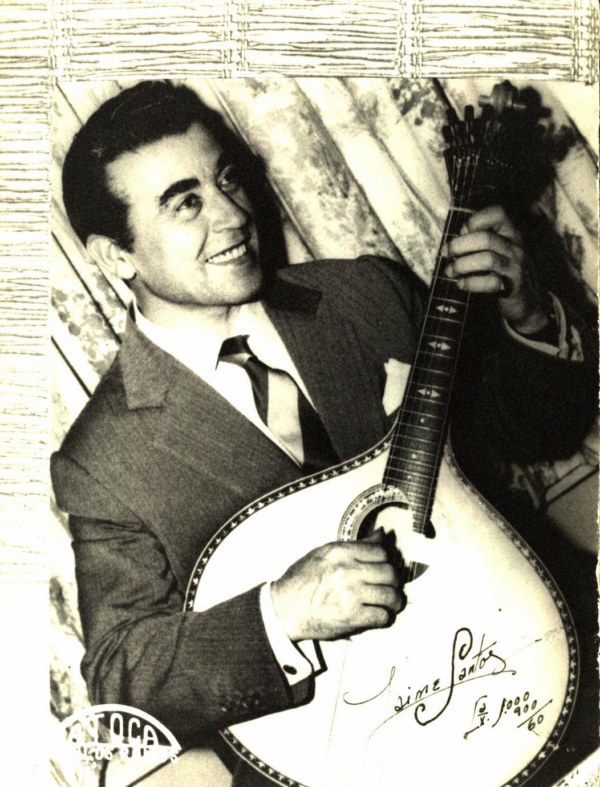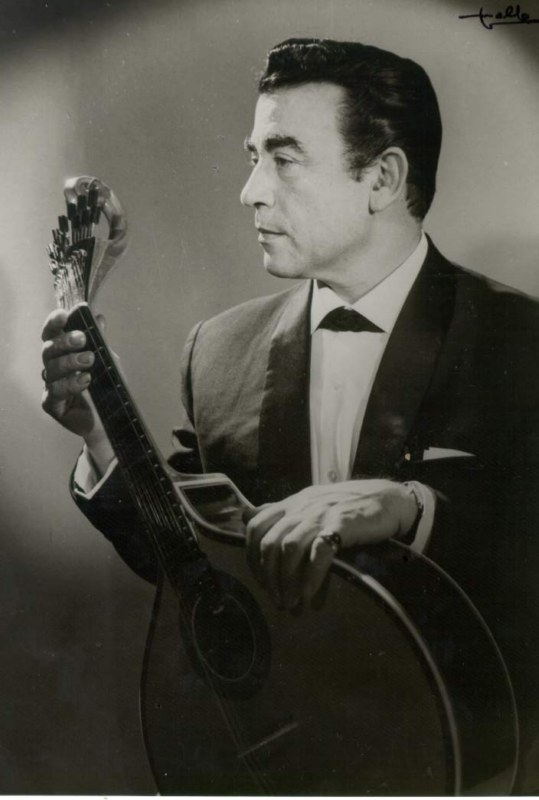Know more:
Jaime Santos
(N. 1 June, 1909 - M. 4 July, 1982)Jaime Tiago dos Santos was born in Lisbon in the Santa Engrácia parish on the 1 June 1909. Although of humble descent there was musical talent in his family – especially his mother’s father, Manuel dos Santos (Manuel Jardineiro), who played the Portuguese guitar and sang the fado. At 5 Jaime Santos began to finger the old Portuguese guitar of his family and as an apprentice-joiner he played with wood sticks. At 12 he naturally played Spanish guitar, mandoline and violin at small popular feasts and at popular associations. (Sucena 1992:101)
In the beginnig of his career as musician Jaime Santos played the Spanish guitar, accompanying Portuguese guitar players José Marques (Piscalarete), Fernando de Freitas, Gonçalves Dias and Bento Camacho. (op.cit:101)
He married a daughter of Georgino de Sousa and his father-in-law encouraged him to change his instrument and start playing the Portuguese guitar. Later on he invited him as Portuguese guitar player to join his ensemble of Portuguese and Spanish guitars (1937/38). In 1939/1940, together with Spanish guitar player Miguel Ramos, Jaime Santos joined the cast of “Café Luso”, at Avenida da Liberdade. Then he was hired, together with Casimiro Ramos, to play at “Retiro da Severa”, whose impresario, José Jorge Soriano, in order to attract the public, announced on the newspapers that a possible grudge between Armandinho and Jaime Santos. But they both admired each other and they refused, quitting. Latter on the pairs "Armandinho/Santos Moreira" and "Jaime Santos/Miguel Ramos" performed on alternate days at “Retiro da Severa”, a fact that worsened the relationship between the two musicians. (op.cit:101)
While touring Northern Portugal, Jaime Santos performed at Cine-Teatro de Guimarães. In 1944 Jaime Santos was invited to join the Conjunto Português de Guitarras, of Martinho D' Assunção, which also included António Couto and Alberto Correia. They played at “Casablanca” (currently Teatro ABC). In 1945 the group was composed of Martinho D´Assunção, Francisco Carvalhinho and Alberto Correia and began to perform at the “Mirante”.
Together with Pais da Silva (Spanish guitar), he performed at “Cervejaria Monumental” on the 27 February 1946.
Fame gave Jaime Santos the opportunity of participating in the film «Fado - História de uma Cantadeira» (1948), directed by Perdigão Queiroga. Also in 1948 he accompanied Amália in short films by Augusto Fraga on fado themes. He also participated in the film Les amants du Tage» (1955), by Henri Verneuil.
As an evidence of his talent, Cuban director Xavier Cugat invited Jaime Santos to play with his orchestra. Trumpet player Louis Armstrong expressed his admiration at him, “for the way in which he managed, only with six double guitar chords, to obtain such rich expression of sounds”. (op.cit:102)
Jaime Santos accompanied Amália Rodrigues at the beginning of her career, performing at shows all over Portugal and abroad, namely in Spain, France, USA and Mexico. His solo performances also achieved a tremendous success. Special reference should also be made to a tour to the former Portuguese colonies of Mozambique and Angola, as well as South Africa, accompanying Alberto Ribeiro and Maria Pereira.
In 1960, together with Spanish guitar player Américo Silva, he performed at Amsterdam’s Kleine Komedie, accompanying artist Clara D´Ovar. In 1961 he performed for a year in Paris at restaurant “O Fado”, owned by Clara D`Ovar.
The guitar player and several popular poets, like João Linhares Barbosa, Francisco Radamanto, Frederico de Brito, among others, developed a close cooperation. As a result Jaime Santos composed a series of melodies, with special reference to "A Minha Guitarra", "Corrido Fidalgo", "Corrido do Mestre Zé", "Danças Portuguesas", "De Nova Iorque a Lisboa", "Fado das Berlengas", "Festa na Aldeia", "Marcha Fadista", "Menor da Velha Guarda", "Nostalgia", "O Meu Sentir", "Primavera em Flor", "Quando o Meu Filho Nasceu", "Rapsódia de Fados Antigos", "Suite em Mi Maior", "Tempos Antigos", "Variações em Lá Menor", "Variações em Mi Menor", "Variações em Ré Maior", "Variações em Si Menor", "Variações Sobre o Fado Corrido", "Variações Sobre o Fado Maggioly", "Variações Sobre o Fado Mouraria", "Variações Sobre o Fado Zé da Melena", etc. A number of these fado songs became true classics, performed by the best fado singers, namely Carlos Ramos, Fernanda Maria, Manuel de Almeida, Lucília do Carmo, Estela Alves, Fernanda Peres, Amália Rodrigues and Carlos do Carmo, among many others. (Cabral 1999:243)
Jaime Santos recorded most of the above pieces, mostly accompanied by Martinho D´Assunção, Santos Moreira, Américo Silva and Francisco Perez Paquito, among others.
Throughout his artistic career he performed at “Lisboa à Noite” and returned, in the late 1970’s, to “Luso” (antigo Café Luso). In addition to technically mastering the performance of Portuguese guitar, Jaime Santos also made a few experiments as instrument maker, by “changing the shape of the case, modifying its internal structure and the dimension of the sides, so as to obtain more sound and a richer timbre” (cf. A Guitarra Portuguesa).
He died in Lisbon on the 4 July 1982.
His son, Jaime Santos Júnior is one of the best Spanish guitar players of today.
Source:
Sucena, Eduardo (1992), “Lisboa, O Fado e os Fadistas”, Lisboa, Veja;



-
O Meu Sentir Jaime Santos (Jaime Santos)